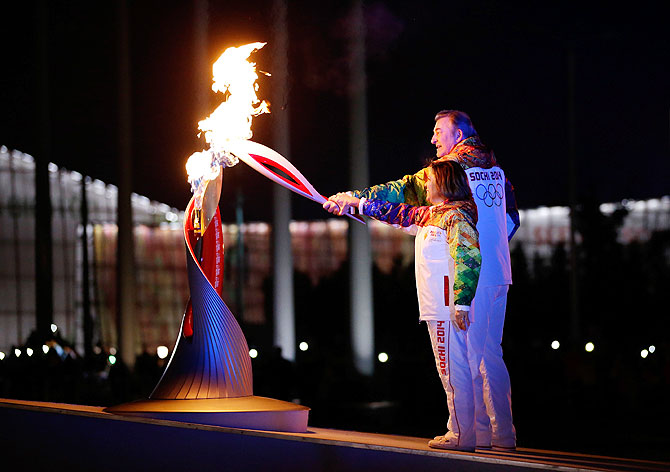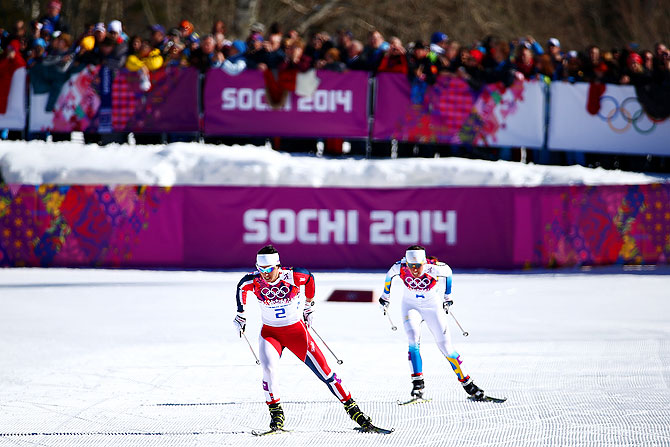 | « Back to article | Print this article |
'This is the craziest thing that ever happened'
Russia's Winter Olympics sprang into action on Saturday with the first five gold medals decided, and the world began to forget the security fears and political wrangling that had marred the buildup to the most expensive Games ever staged.
The United States claimed the first gold in the slopestyle event held amidst the snow-capped peaks of the Caucasus Mountains, some 40 km (25 miles) northeast of the Black Sea resort town of Sochi where the main Olympic park is located.
On a clear, crisp day, U.S. snowboarder Sage Kotsenburg leapt and twisted high in the air, riding an almost flawless first run to win the slopestyle crown.
Rock music blared and fans danced as the event, which bears similarities to skateboarding, made its debut in an initiative to attract a younger demographic to Winter Olympic sport.
"I have no idea what's actually going on. This is the craziest thing that ever happened," Kotsenburg said.
'There is no 'help' between countries'
The only hint of a blemish on an enthralling day of sport were reports suggesting the United States and Russia were conspiring to help each another win figure skating gold medals, even though such an arrangement would seem to make little sense.
"Comments made in a L'Equipe story are categorically false," the American governing body, U.S. Figure Skating, said in a statement on Saturday.
"There is no 'help' between countries."
Several U.S. media picked up on a report saying the arrangement would help Meryl Davis and Charlie White to become the first Americans to win the Olympic ice dance gold, while Russia in return would benefit in team and pairs competitions.
Judging scandals have often blighted figure skating, the most famous being at the 2002 Salt Lake City Olympics when allegations of vote-rigging led to Canadians being awarded duplicate golds in the pairs competition with Russians.
On Saturday, Russia's Games chief Dmitry Chernyshenko was questioned about the choice of triple Olympic figure skating champion Irina Rodnina to light the flame -- a huge honour in the sporting world.
'The Olympic Games are not about politics'
A national hero in Russia and member of parliament loyal to Putin, she had caused an outcry in the United States last September by re-tweeting a photoshopped picture showing President Barack Obama chewing and a hand waving a banana in front of him.
"Irina Rodnina is from the club of three-times gold medallists and one of the most respected in the world," Chernyshenko told reporters.
"The Olympic Games are not about politics," he said.
There were plenty of empty seats at Sochi venues on Saturday. Organisers said about 70 percent of tickets had been sold for the Games overall, and that some venues' seating capacity had to be reduced for security reasons.
Records tumble on Day 1
Those who did show up were treated to some memorable moments, notably when Canada's Justine Dufour-Lapointe won the women's moguls freestyle skiing gold medal ahead of her sister Chloe, who took silver.
Norwegian Marit Bjoergen, dubbed the ‘Iron Lady’ and the most successful athlete of the 2010 Games with five medals, won the cross-country skiathlon.
Sven Kramer of the Netherlands successfully defended his 5,000 metres title in an Olympic record time at the Adler Arena.
And Norway's Ole Einar Bjoerndalen matched compatriot Bjorn Daehlie's Winter Games record of 12 medals when he won the biathlon men's 10 km sprint. At 40, he became the oldest Winter Games gold medallist.
Looking ahead to Sunday's big draw, the men's downhill, American Bode Miller laid bare the dangers faced by competitors when he said the treacherous Rosa Khutor piste "could kill you".

© Copyright 2024 Reuters Limited. All rights reserved. Republication or redistribution of Reuters content, including by framing or similar means, is expressly prohibited without the prior written consent of Reuters. Reuters shall not be liable for any errors or delays in the content, or for any actions taken in reliance thereon.



